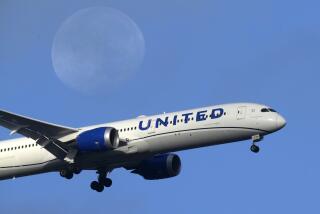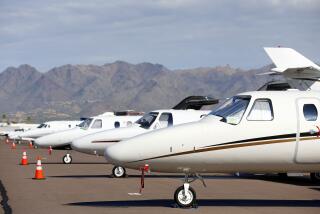TRAVEL INSIDER : Frequent Fliers Tempt Fate Number 2: Taxes : Airlines: The Internal Revenue Service hasn’t yet gone after mileage programs--but it’s thinking about it.
- Share via
Here we are in the summer of 1993, 14 years into the era of deregulated airline travel, 12 years into the age of the frequent flier program. Look around any major airport, and you’ll see students of the system carefully questioning reservationists to be sure they’re getting maximum mileage. Listen, and you may hear an odd hush--the silence of someone who’s getting away with something.
That’s the sound of business travelers hoarding company-bought frequent flier miles for personal use. I am one of them, and there are millions more. For us and our bosses, mileage credits have evolved into an unwritten part of the job benefits package--a tax-free perk to blunt the inconvenience of time spent away from home.
With so many companies looking into every corner for ways to build revenue and cut costs these days, it may seem odd that all those accounting departments are content to leave such circumstances be. But in the vast majority of companies, capturing employee mileage rewards is viewed as more trouble than it’s worth. Even though more corporate officers seem to be talking about this subject these days, authorities say, corporate policies aren’t likely to change.
In fact, instead of worrying about their employers taking back miles, wary travelers should be pondering the IRS, and the chances that tax collectors will step in to tax their mileage awards as undeclared income.
Frequent flier programs began in 1981, when airlines were groping for a sales device that would instill customer loyalty. American Airlines’ solution was American AAdvantage, and soon all the other major carriers were on the bandwagon.
By all accounts, the culture of frequent flight has grown far beyond anyone’s initial expectations. At American, a spokesman says, AAdvantage membership has grown from 283,000 in the program’s first year to more than 19 million now.
Given the losses most U.S. airlines have reported in recent years, many carriers probably wouldn’t mind if frequent flier discounting were abandoned. But no one wants to be first to publicly pull back. (Theoretically, the Clinton Administration’s new National Commission to Insure a Strong, Competitive Airline Industry could wade into that subject, but there are no such indications so far.)
As frequent flyer programs have grown, business travelers have become some of the most expert exploiters of the system, and their corporate sponsors haven’t come close to keeping up. In fact, among several hundred U.S. businesses queried in the 1984 Runzheimer Survey and Analysis of Business Travel, Policies and Costs, 62% said they considered frequent flier awards to be employee property. By the time Runzheimer was conducting its 1991 survey, that figure had risen to 88%. Six percent of the respondents in the more recent survey said they considered the awards company property and 6% viewed the awards as a shared benefit.
Perhaps most significant among all these numbers are these: 92% of the 749 companies surveyed in 1991 said they do not monitor their employees’ accumulations of mileage credit.
The most obvious reason for this is that it’s difficult for a company to interpose itself between the traveler and an airline. To reserve frequent flier miles for business use, companies often rely on employees to open separate frequentflier accounts for leisure and business travel. But many airlines, including United, Delta and Southwest, tell fliers they are allowed only one account. (United spokesman Joe Hopkins does note that once travelers receive mileage award coupons from United, they can be passed on to corporate colleagues or anyone else.)
Among the large organizations that have asserted ownership of their employees’ miles: Cincinnati-based Procter & Gamble, Seattle-based Boeing, and the United States federal government. Among the firms that have tried and then discarded the idea: Los Angeles-based Hughes Aircraft and its parent, Detroit-based General Motors.
Rolfe Shellenberger, senior consultant to the travel management consulting firm Runzheimer International--and a designer of the AAdvantage program 12 years ago--estimates that companies could cut as much as 10%-25% from their travel budgets by reclaiming employee miles. But such savings are usually easier to achieve in small business, he says, and come at a potentially substantial cost to upper-management employee relations.
Shellenberger’s advice to companies considering a new mileage policy: “If you can get away with it from an employee morale standpoint, go ahead and do it. But this has become such a precious thing for travelers. If you don’t have a corporate culture that supports the concept of recapture, you’re going to have a real problem.”
His cautionary words to the business traveler who continues to collect personal miles: “His (or her) gain is the company’s loss. And there might be a time when the environment insists that this goody has got to go away.”
No discussion of goodies is complete without a few words on the IRS position regarding the tax status of said goodies. In the case of frequent flier miles, there are many words, some alarming, none conclusive.
Though the airlines argue that mileage awards are rebates and as such should not be taxed, the official IRS position is that an award that arises from company-purchased tickets should be defined, and taxed, as personal income.
* MORE ON FREQUENT FLIERS: New schemes for building mileage credits. L23.
Case in point: IRS officials recently audited the tax returns and mileage awards of several employees from a Maitland, Fla., computer software firm. In its May issue, Frequent Flyer magazine reported that auditors scrutinized at least five workers’ 1990 and 1991 tax returns for mention of frequent flier awards, and demanded back tax payments of up to $1,300 in one case.
Here, however, the issue gets deeply murky. IRS officials concede that virtually no Americans now declare their frequent flier awards. And IRS spokespersons have no official answer for two rather key questions: 1) Do awards become taxable when the benefit is offered by the airline, or later, when you redeem the benefit and actually take your free or upgraded flight? 2) How do you calculate you award’s value? After all, depending on when you buy your ticket and what restrictions are attached, fares to the same city vary by hundreds of dollars.
At least some IRS officials seem to be offering between-the-lines reassurances to frequent fliers. “We’re certainly aware of the Florida case, but it doesn’t demonstrate any change in position of the IRS on the issue, and it doesn’t indicate increased enforcement or attention to that issue,” says Nancy McCurley, spokeswoman for the IRS in Los Angeles. “We recognize that enforcement is very difficult, particularly with regard to the proper valuation of the benefit.” And she cites the “political sensitivity” of the issue.
In the Florida case, she and others have noted, the workers were not merely using their frequent flier benefits but selling them back to the company. That, it seems, solved the value question: Their tax bills are said to have been calculated at 1.5 cents per mile, the going rate paid by Florida coupon brokers.
Does this mean most frequent fliers can breathe easily? Not necessarily. Some industry-watchers, including Phoenix-based “Mileage & Points” newsletter publisher Stan Dale (12629 N. Tatum Blvd., Suite 488, Phoenix, Ariz. 85032; 602-953-9237; annual subscriptions run $17.95 a year), believe a crackdown is coming, and that it will capitalize on the new administration’s fluency in the world in information technology.
Dale, who has made a long, detailed study of the issue, goes so far as to predict the crackdown date. Starting in January, 1994, he forecasts, the IRS will start broadly enforcing the tax code of frequent flier awards. Airlines would be required to input Social Security numbers of those collecting frequent flier awards. Mileage credit would count as income upon redemption. Redemption value would be established by available fares at the moment of redemption, and input by the airline reservationist. At year’s end, the airlines would forward to the IRS a list of customers and their annual total of taxable frequent flier “income.”
All this, Dale asserts, could raise another $1 billion a year in tax revenues, and requires no action by Congress, the president or any court. And, Dale adds, it won’t last long. He believes the move will cause airlines to kill frequent flier programs as now constituted and replace them with non-taxable incentive programs, which may resolve the employer-employee mileage ownership issue along the way.
More to Read
Sign up for The Wild
We’ll help you find the best places to hike, bike and run, as well as the perfect silent spots for meditation and yoga.
You may occasionally receive promotional content from the Los Angeles Times.







